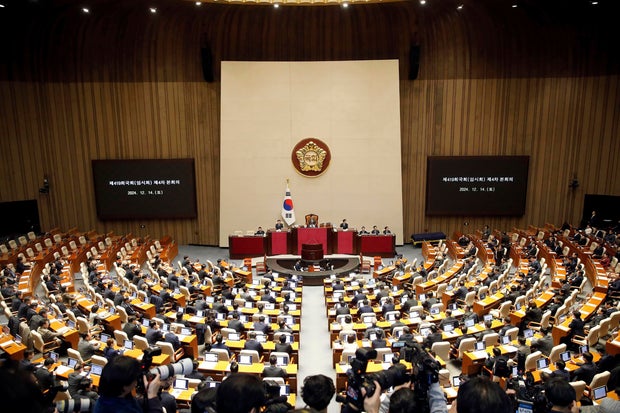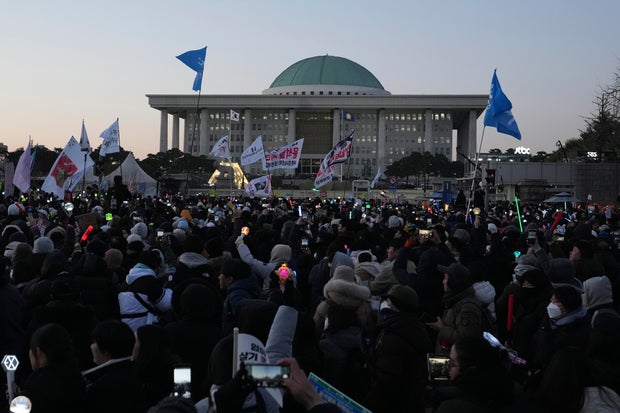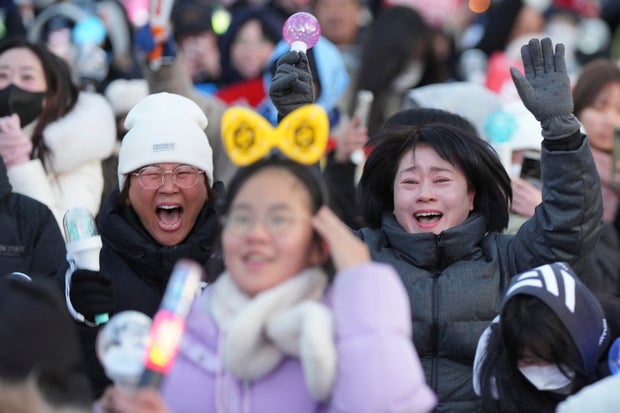South Korea's parliament on Saturday impeached President Yoon Suk Yeol over his extraordinary and short-lived martial law order, a move that ended days of political paralysis but sparked intense debate over Yoon's fate, while as a large crowd shouted to mark another challenging time in the country's resilient democracy.
The National Assembly passed the motion 204-85. Yoon's presidential powers and duties were later suspended and Prime Minister Han Duck-soo, the country's No. 2 official, took over presidential powers later on Saturday.
The Constitutional Court has up to 180 days to decide whether to dismiss Yoon as president or restore his powers. If he is thrown out of office, a national election for his successor must be held within 60 days.
It was the second vote at the National Assembly on Yoon's impeachment after ruling party lawmakers boycotted him last Saturday. Some People Power Party lawmakers have since said they would vote for Yoon's impeachment as public protests intensified and his approval rating fell.
Woohae Cho/AP
National Assembly speaker Woo Won Shik said Yoon's impeachment was the result of “the people's strong desire for democracy, courage and commitment.”
Hundreds of thousands of people who had gathered near the parliament were laughing, waving flags and waving colorful K-pop sticks, as a leading activist shouted on stage, “We keep the constitutional order!”
In downtown Seoul, another large crowd gathered in support of Yoon, but became subdued after hearing that he had been fired. Both rallies have been largely peaceful.
Yoon issued a statement saying he would “never give up” and called on officials to maintain stability in government activities during what he described as a “temporary” suspension of his presidency.
“I will accept all the criticism, encouragement and support directed at me, and I will continue to do my best for the country until the last moment,” said Yoon.
Lee Jin-man / AP
Yoon's Dec. 3 suspension of martial law, the first of its kind in more than four decades in South Korea, lasted only six hours, but has caused a major political uproar, halted diplomatic activity and has disrupted financial markets. Yoon was forced to lift his order after parliament voted unanimously to overturn it.
Han, who became acting leader, ordered the military to strengthen its security posture to prevent North Korea from launching provocations by mistake. Han asked the foreign minister to inform other countries that South Korea's main foreign policies remain unchanged, and the finance minister to work to mitigate the potential negative impact of the political turmoil. has slowed the economy, according to Han's office.
South Korea's executive power is vested in the president, but the prime minister leads the country if the president becomes incapacitated. Han is an experienced official and has previously held a series of key government positions such as trade and finance and was ambassador to the US He was also prime minister from 2007-2008.
After declaring martial law, Yoon sent hundreds of soldiers and police officers to parliament to try to block his vote on the decree, before pulling out after parliament rejected Yoon's decree. No major violence occurred.
The opposition parties and many experts accuse Yoon of sedition, citing a law that classifies as sedition the holding of a riot against established state authorities in order to violate the constitution. weakening They also say that the president in South Korea is only allowed to declare martial law during war or a similar crisis and that he has no right to suspend the activities of the parliament even under martial law.
The impeachment motion said that Yoon “promised a revolution that hurts the peace of the Republic of Korea by holding a series of riots.” They said Yoon's deployment of military and police forces threatened the National Assembly and the public and that his martial law order was aimed at disrupting the constitution.
In a fiery speech on Thursday, Yoon had rejected the rebellion charges, calling his order an administrative act. Conservative Yoon said he aimed to issue a warning to the main opposition Liberal Democratic Party, calling it a “monster” and “anti-state forces” that he argued have to mobilize his legislative muscles to oppose key officials and undermine the government's budget bill for. the following year. He said the use of troops was intended to maintain order, rather than disrupt it.
Democratic Party leader Lee Jae-myung called Yoon's speech a “mad declaration of war” against his own people.
Observers say Yoon's speech suggested a focus on legal preparations to defend his martial law order at the Constitutional Court, even as opinion polls showed more than 70% of Koreans South supports his impeachment. A survey released Friday put Yoon's approval rating at 11%, the lowest since he took office in 2022.
Some of Yoon's claims do not match the testimony of some military commanders whose troops were sent to the Senate.
Lee Jin-man / AP
In particular, Kwak Jong-keun, the head of the Army's Special Warfare Command, said that after declaring martial law, Yoon called him and asked his soldiers to “quickly destroy the door and the lawmakers who to draw out.” Kwak said he did not carry out Yoon's orders.
Yoon is the third South Korean president to be impeached while in office. In 2016, parliament impeached Park Geun-hye, the country's first female president, following a corruption scandal. The Constitutional Court upheld her impeachment and removed her from office.
In 2004, President Roh Moo-hyun was impeached in parliament on charges of violating the election law but the court overturned his impeachment and restored his presidential powers. sit with him Roh jumped to his death in 2009, after leaving office amid a corruption scandal involving his family.
Yoon was banned from leaving South Korea.
The president enjoys immunity from criminal charges but that does not extend to charges of rebellion or treason. After that, Yoon could be investigated, detained, arrested or charged with his martial law order, but many observers doubt that authorities will forcefully detain him because and that there could be a conflict with his presidential security service.
Defense minister Yoon, the police chief and the head of the Seoul metropolitan police agency were arrested. Senior military and other government officials oppose investigations.








